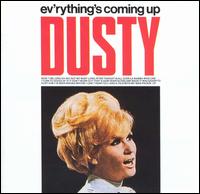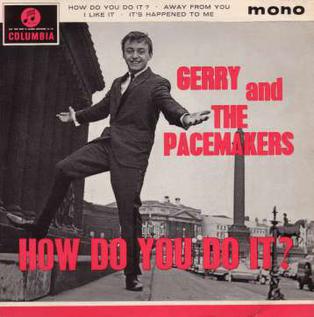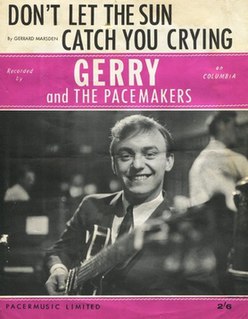
Gerry and the Pacemakers were a British beat group prominent in the 1960s Merseybeat scene. In common with the Beatles, they came from Liverpool, were managed by Brian Epstein, and were recorded by George Martin. Their early successes alongside the Beatles were instrumental in popularizing the Merseybeat sound and launching the wider British beat boom of the mid-1960s.
The Merseybeats are an English beat band that emerged from the Liverpool Merseybeat scene in the early 1960s, performing at the Cavern Club along with the Beatles, Gerry and the Pacemakers, and other similar artists.

"You'll Never Walk Alone" is a show tune from the 1945 Rodgers and Hammerstein musical Carousel. In the second act of the musical, Nettie Fowler, the cousin of the protagonist Julie Jordan, sings "You'll Never Walk Alone" to comfort and encourage Julie when her husband, Billy Bigelow, the male lead, stabs himself with a knife whilst trying to run away after attempting a robbery with his mate Jigger and dies in her arms. The song is reprised in the final scene to encourage a graduation class of which Louise is a member. The now invisible Billy, who has been granted the chance to return to Earth for one day in order to redeem himself, watches the ceremony and is able to silently motivate Louise and Julie to join in with the song.

Gerard Marsden MBE was an English singer-songwriter, musician and television personality, best known for being leader of the Merseybeat band Gerry and the Pacemakers. He was the younger brother of fellow band member Freddie Marsden.

Laurie Records was a record label established in New York City in 1958 by brothers Robert and Gene Schwartz, and Allan I. Sussel. Among the recording artists on Laurie's roster were Dion and the Belmonts, The Chiffons, The Jarmels, The Mystics, Bobby Goldsboro, and The Royal Guardsmen.

"From Me to You" is a song by the English rock band the Beatles that was released in April 1963 as their third single. It was written by Paul McCartney and John Lennon. The song was the Beatles' first number 1 hit on what became the official UK singles chart but the second, after "Please Please Me", on most of the other singles charts published in the UK at the time. "From Me to You" failed to make an impact in the United States at the time of its initial release. Instead, a 1963 cover version released by Del Shannon resulted in the song becoming the first Lennon–McCartney tune to enter the US pop charts. The Beatles' original was rereleased in the US in January 1964 as the b-side to "Please Please Me", and reached number 41.
Daniel Joseph Anthony Meehan, professionally known as Tony Meehan, was a founder member of the British group the Drifters, with Jet Harris, Hank Marvin and Bruce Welch, which would evolve into the Shadows. He played drums on early Cliff Richard and the Shadows hits and on early Shadows instrumentals.

"Ferry Cross the Mersey" is a song written by Gerry Marsden. It was first recorded by his band Gerry and the Pacemakers and released in late 1964 in the UK and in 1965 in the United States. It was a hit on both sides of the Atlantic, reaching number six in the United States and number eight in the UK. The song is from the film of the same name and was released on its soundtrack album. In the mid-1990s, a musical theatre production, also titled Ferry Cross the Mersey, related Gerry Marsden's Merseybeat days; it premiered in Liverpool and played in the UK, Australia, and Canada.

The UK Singles Chart is compiled by the Official Charts Company (OCC), on behalf of the British record industry, listing the top-selling singles in the United Kingdom, based upon physical sales, paid-for downloads and streaming. The Official Chart, broadcast on BBC Radio 1 and MTV, is the UK music industry's recognised official measure of singles and albums popularity because it is the most comprehensive research panel of its kind, today surveying over 15,000 retailers and digital services daily, capturing 99.9% of all singles consumed in Britain across the week, and over 98% of albums. To be eligible for the chart, a single is currently defined by the Official Charts Company (OCC) as either a 'single bundle' having no more than four tracks and not lasting longer than 25 minutes or one digital audio track not longer than 15 minutes with a minimum sale price of 40 pence. The rules have changed many times as technology has developed, the most notable being the inclusion of digital downloads in 2005 and streaming in July 2014.

"Don't Let the Sun Go Down on Me" is a song written by English musician Elton John and his lyricist Bernie Taupin. It was originally recorded by John for his eighth studio album, Caribou (1974), and was released as a single that peaked at number two on the Billboard Hot 100 chart, and reached number 16 on the UK Singles Chart.

Ev'rything's Coming Up Dusty is the second studio album by singer Dusty Springfield, released on Philips Records in the UK in 1965. Springfield's 1964 debut album, A Girl Called Dusty, sold well enough to make her Philips Records' top-selling female artist. For this, her second album, Philips presented it in a gatefold sleeve and included extensive liner notes. While including a number of fairly standard "pop" songs, Ev'rything's Coming Up Dusty also saw Springfield venturing more into show tunes like "Who Can I Turn To ?" as well as the soul music for which Springfield became so well known for singing. "Doodlin'" and "That's How Heartaches Are Made" were minor hits for Baby Washington, one of Springfield's personal favourite singers. Springfield also included the song "La Bamba", which was a popular concert number for her, though not in step with the general style of the album. The album gave Dusty another chart success peaking at No.6 on the UK Charts and No.4 on the NME charts that following month.

Buster: The Original Motion Picture Soundtrack is the soundtrack for the 1988 British film Buster. The album is essentially a collection of oldies, tucked in between two Phil Collins songs that were recorded for the film, in which he starred. "Two Hearts" was specially written for the film, having earned a Grammy Award for Best Song Written Specifically for a Motion Picture or Television in 1989, a Golden Globe Award for Best Original Song as well as an Academy Award nomination for Best Original Song, and "A Groovy Kind of Love" with a Grammy Award nomination for Best Pop Vocal Performance, Male was a remake of a song taken to #2 in the UK Singles Chart in 1965 by The Mindbenders. Both were released as singles, and topped the Billboard Hot 100 chart, with "A Groovy Kind of Love" also reaching #1 in the UK. Other new songs include Collins' "Big Noise" and Four Tops' "Loco in Acapulco", co-written by Collins. At the Brit Awards in 1989 it won for Soundtrack/Cast Recording, while Collins received the award British Male Artist for his contribution to the soundtrack album.

"How Do You Do It?" is the debut single by Liverpudlian band Gerry and the Pacemakers. It was written by Mitch Murray. The song reached number one in the UK Singles Chart on 11 April 1963, where it stayed for three weeks.

"I Like It" is the second single by Liverpudlian band Gerry and the Pacemakers. Like Gerry Marsden's first number one "How Do You Do It", it was written by Mitch Murray. The song reached number one in the UK Singles Chart on 20 June 1963, where it stayed for four weeks. It reached No. 17 in the American charts in 1964.
Louise Cordet is an English pop singer who also sang in French, best known as a one-hit wonder for her 1962 single, "I'm Just a Baby".

"Don't Let the Sun Catch You Crying" is a song written by Gerry Marsden, Freddie Marsden, Les Chadwick and Les Maguire, the members of British beat group Gerry and the Pacemakers. It was first recorded and issued as a single by Louise Cordet in February 1964. Shortly after Cordet's version failed to chart, the song was recorded by Gerry and The Pacemakers themselves in April 1964. The Gerry and The Pacemakers recording became an international hit, and remains one of their best known singles.

Sigrid Solbakk Raabe, known mononymously as Sigrid, is a Norwegian singer and songwriter. She has released two studio albums, Sucker Punch (2019) and How to Let Go (2022), both of which charted in Norway and the United Kingdom. She has also released two EPs.
This is the discography of British beat group Gerry and the Pacemakers.














